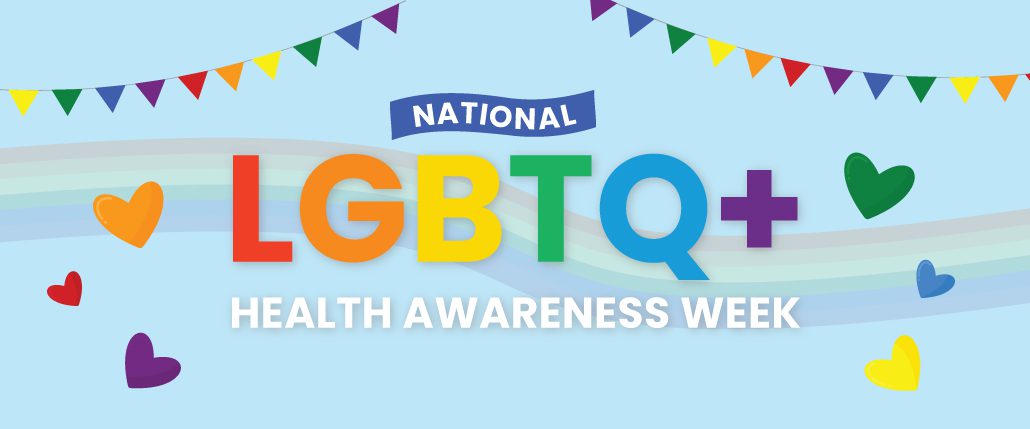
National LGBTQ Health Awareness Week
By Leo Kirkham
Sponsored by the National Coalition for LGBTQ Health, the 21st annual National LGBTQ Health Awarness Week is March 20-24, 2023. This week celebrates good health for LGBTQ people, and brings awareness to the health disparities faced by the community.
Looking for therapy for a teen or young adult? The Help Group’s Lumina Counseling has appointment availability throughout the week and weekends, both in-person and online. To schedule an appointment or inquire for more information, call 818-779-5100 or visit our website to get started.
What is a health disparity?
A health disparity happens when one group of people has a different health outcome than another group, all other things being equal. For example, Black women are more likely to die from breast cancer than white women. This has to do with many factors – racial discrimination from healthcare providers, financial barriers to obtaining medical care, cultural norms around preventative breast cancer screenings (such as a white actress being chosen for a breast cancer screening commercial), and racism at a systemic level that keeps all of these connected factors in place.
For the LGBTQ community, health disparities are strongly related to discrimination, hostility, and social rejection. Whether it is from a family member, friend, teacher, boss, doctor, or another person, discriminatory behavior and words have an impact on the health of LGBTQ people.
Specifically, LGBTQ people have poorer outcomes with mental health, physical health, and access to healthcare. LGBTQ people are at a greater risk of suicide and suicidal thoughts and behaviors, mood disorders and anxiety, eating disorders, alcohol and substance use, and tobacco use.
These mental health concerns tie into physical health, such as liver disease, lung disease, heart disease, chronic pain, and the many health impacts of eating disorders. Those suffering from mental health distress may also be more likely to engage in risky sexual behavior, which can lead to trauma, STIs, and unwanted pregnancy. Gay and bisexual men are at a higher risk of HIV, as are transgender women, Black men, and Latino men. Lesbian and bisexual women and transgender men are at a higher risk of breast cancer (source).
Access is also an issue. LGBTQ people are less likely to have a regular healthcare provider or health insurance. Older LGBTQ adults report poorer health, more chronic conditions, and less social support. LGBTQ people are also more likely to report poor quality healthcare, unfair treatment by providers, and general lack of cultural competence by providers.
What causes these disparities for this population?
First, the minority status of LGBTQ people causes stress. Stress is a leading cause of both mental and physical health problems.
Discrimination against LGBTQ people creates systemic barriers to accessing quality healthcare. Discrimination and harassment in the workplace against queer and transgender employees makes it more difficult for LGBTQ people to stay employed at queer-friendly jobs that provide healthcare. Discrimination from healthcare providers themselves creates lasting harm for LGBTQ patients, who carry trauma and fear around medical care for the rest of their lives. 15% of LGBTQ people report delaying care or avoiding care altogether as a result of fear of discrimination. This number doubles to 30% for transgender patients (source).
Even a well-meaning doctor who considers themself an ally to the LGBTQ community can cause harm to an LGBTQ patient through ignorance and lack of knowledge. Many transgender patients find themselves doing research on transition care and teaching their own doctors how to care for them. 1 in 3 transgender patients have reported needing to teach their doctor about their identity in order to receive adequate care (source). Medical schools do not teach hormone therapy as a standard practice; a general practitioner would have to actively seek out education in this area to become informed. The lack of education around LGBTQ health issues and LGBTQ culture and identity creates a medical environment where LGBTQ people are not included, welcomed, or accommodated.
Many insurance plans do not cover transition-related healthcare procedures, such as hormones or surgery, or the cost of these procedures after insurance is still prohibitive for transgender people with higher rates of poverty, unemployment, and homelessness. Additionally, insurance plans sometimes mistakenly reject requests, such as rejecting a transgender man’s claim for a pap smear because his insurance profile reads as “male” (source).
Lastly, there is also a lack of clinical research on LGBTQ-related health issues. Where funding and research does not exist, neither does quality healthcare.
The good news is that change is being made. Advocates, students, medical professionals, and community members are working to improve the quality of healthcare that LGBTQ patients receive. Groups like the LA LGBT Center have programs like the Trans Wellness Center which provide low-cost transition-related health and wellness services for transgender and non-binary people in Los Angeles. Legislation like S.B. 107 in California will protect transgender children and their families fleeing states like Texas, Idaho, and Florida, which are trying to criminalize access to trans healthcare for youth.
If you are searching for an LGBTQ-affirming medical provider for yourself or your child, please see GLMA or OutCare.
Here’s to good health for us all.
